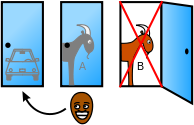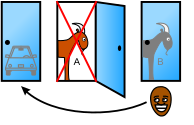The Monty Hall problem is a famous paradoxical problem in probability (chance). The problem is based on a television game show from the United States, Let's Make a Deal. It is named for this show's host, Monty Hall.
In the problem, there are three doors. A car (prize of high value) is behind one door and goats (booby prizes of low value) are behind the other two doors. First, the player chooses a door but does not open it. Then the host opens a different door. The host knows what is behind every door, and always chooses a door with a goat behind it. (If there are goats behind both other doors, one is chosen at random.) Last, the player chooses whether to keep what is behind the original door or to change to the remaining door (the one the host did not open).
The rules of the problem are that the host has to open a door with a goat behind it and the player has the opportunity to switch. The question is whether changing choices increases the chances of getting the car.
Most people feel that the car is equally likely to be behind either of the two doors that are still closed, so that changing doors does not affect the chance of getting the car. The true answer is that changing choices increases the chances of getting the car from 1/3 (one out of three) to 2/3 (two out of three).
That 2/3 (two out of three) chance comes from the fact in the initial door choice, the player has a 1/3 (one out of three) chance of picking the door with the car. There is a 2/3 (two out of three) chance if the car is behind one of the other two doors. If the player could switch from their one door to the other two doors this would improve their chances. The fact that the host reveals that one of the other doors contains a goat does not change this probability. The player is still effectively swapping their one door for the other two (even though one of them has been opened).
These are the options:
1. (Lose) : If the player picks the car, then the host will show a goat. Then if the player changes their choice, they will get a goat.
2. (Win) : If the player picks a goat, then the host will show the other goat. Then if the player changes their choice, they will get a car.
3. (Win) : If the player picks the other goat, then the host will show the first goat. Then if the player changes their choice, they will get a car.
So, it is true that if the player changes (switches) then the player will win a car two times out of three.
Other websites
- Monty Hall Problem at Wolfram MathWorld
- Graphical Proof of the Monty Hall Problem
- A Monty Hall Simulator in Javascript Archived 2007-01-29 at the Wayback Machine
- Monty Hall Simulation Online
- Making the Monty Hall Obvious
- A tree-diagram of the Monty Hall problem under the Marilyn vos Savant assumptions
- The Game Show Problem Archived 2010-03-10 at the Wayback Machine
Wikiwand in your browser!
Seamless Wikipedia browsing. On steroids.
Every time you click a link to Wikipedia, Wiktionary or Wikiquote in your browser's search results, it will show the modern Wikiwand interface.
Wikiwand extension is a five stars, simple, with minimum permission required to keep your browsing private, safe and transparent.






